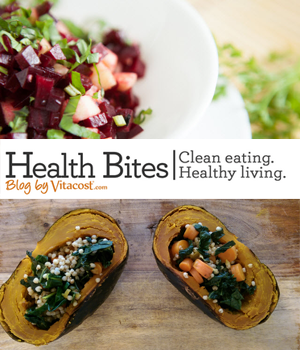Pick Your Protein
Another great guest post from Vitacost.com! Guidelines on how to choose protein – veggies have protein too, not just meat!! Thank you as always for the great information Vitacost ![]() !
!
The great debate rages on. Is plant-derived protein better for you than a slab of steak? There is still no final verdict, but research continues to prove the benefits of both – or either. Meat lovers will defend their diet provides high-quality, or complete, protein; while veggie lovers will proclaim whole-food, plant-based eating is “cleaner” for the body. Luckily, there’s one thing everyone can agree on: protein is essential and should not be excluded from any diet.
Protein is (literally) an essential nutrient, made up of amino acids – the building blocks of our cells. Of the 20 amino acids, nine of them cannot be produced by the body. These are called essential amino acids, and they must be obtained through diet. By consuming protein from complete or incomplete protein sources, the body can adequately make up for what it’s lacking. It’s important to know a complete protein source – such as those from animal products – provides all essential amino acids. Incomplete protein sources provide less than the nine essentials, but consuming multiple incomplete protein sources can together deliver everything you need.
To help you choose which protein source(s) are best for your body, glance at the cheat sheet below. These are some of the best plant and animal sources, with average protein potency shown in grams:
PLANT PROTEIN
Dark green vegetables
Spinach (1 cup, cooked) = 5 grams
Broccoli (1 cup, cooked) = 4 grams
Asparagus (1 cup, raw) = 3 grams
Grains
Quinoa (1 cup, cooked) = 9 grams
Brown Rice (1 cup, cooked) = 5 grams
Whole wheat bread (1 slice) = 3 grams
Legumes
Lentils (1 cup, cooked) = 18 grams
Black beans (1 cup, cooked) = 15 grams
Soy beans (1 cup, cooked) = 29 grams
Nuts
Almonds (1/4 cup, raw) = 8 grams
Cashews (1/4 cup, raw) = 5 grams
Peanut butter (2 tbsp) = 8 grams
Seeds
Sunflower seeds (1/4 cup) = 6 grams
Hemp seeds (3 Tbsp) = 11 grams
ANIMAL PROTEIN
Beef
Ground (3 oz, 75% lean) = 22 grams
Filet Mignon (3 oz) = 24 grams
Poultry
Chicken (3.5 oz, skinless breast) = 31 grams
Turkey (3.5 oz, skinless) = 30 grams
Seafood
Salmon (3 oz, boneless fillet) = 21 grams
Tilapia (3 oz) = 24 grams
Tuna (3-ounce steak) = 25 grams
Dairy
Yogurt (8 oz, fat-free) = 13 grams
Cheese (1 oz, whole milk mozzarella) = 5 grams
Milk (8 oz, 1% milk fat) = 8 grams
Keep in mind the recommended daily allowance (RDA) for protein is 0.36 grams per pound of body weight. For a 160-pound adult, that’s about 58 grams per day. Depending on your daily caloric needs and health status, your protein consumption may be 15 to 25 percent of your total calories. Whether your dietary choices include vegan, gluten-free, low-carb or other, strive to reach these standards and enjoy whatever protein you put on your plate.
This article has been provided by the folks at Vitacost.com. Offering more than just vitamins and supplements, Vitacost.com has a wide selection of over 35,000 organic, natural products for your healthy lifestyle. From health foods and natural hair care items to sports nutrition favorites and pet essentials, Vitacost.com has your needs covered – for less! Take your shopping list to Vitacost.com and take the cost out of healthy living. Vitacost.com is not affiliated with this blog and isn’t responsible for content outside of this article.
By: +Elizabeth Lotts writer for Vitacost.com



That was great info for me, now could you list what a “starchy” vegetable is? I eat a lot of zucchini, mushrooms, spinach, and cabbage, are any if those considered starchy?
Thanks Teresa! The veggies you listed are not starchy at all, they are all packed with water, vitamins, and minerals. Starchy veggies include potatoes, corn, plantains, yuca, beets, beans, peas, winter squash. These are all rich in nutrients, so I would not avoid them. Eating in moderation and listening to your body is key.
Hurray for plant protein! It’s better for the body when coupled with other sources which make it a complete protein, just as Vitacost has offered.
It was interesting to note that there is a little bit of protein in spinach, broccoli, and asparagus (my 3 favorites!). I always ate them for the other nutritional benefits they offer.
Thanks Joanne! I knew you would love this Vitacost post. It’s amazing how much protein you can get from vegetable sources – much cheaper than relying on meat and dairy for protein as well.